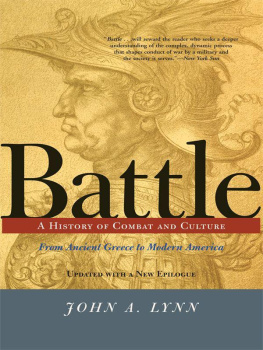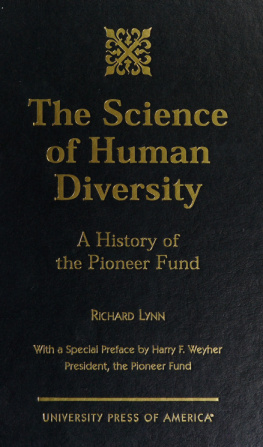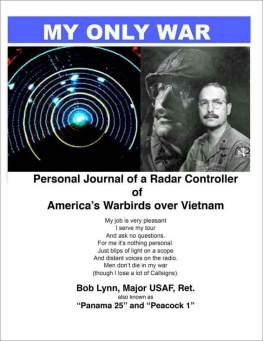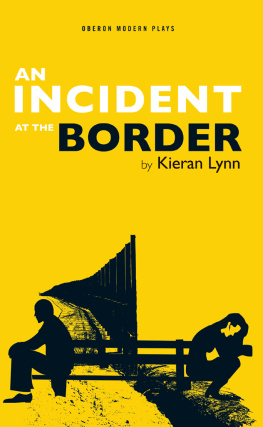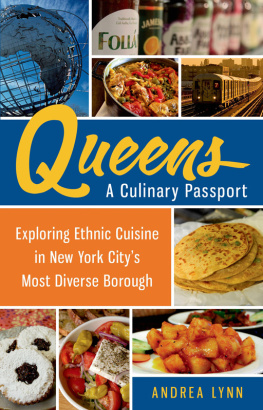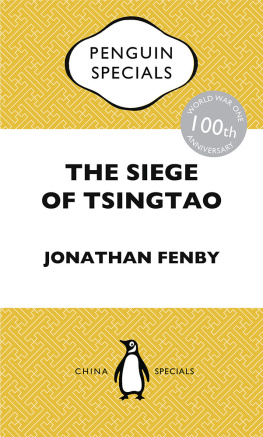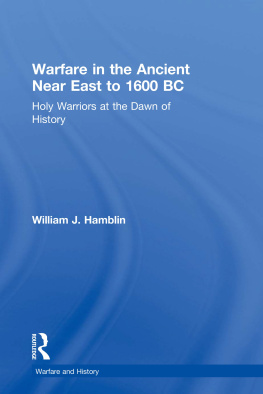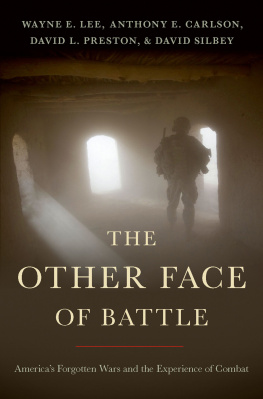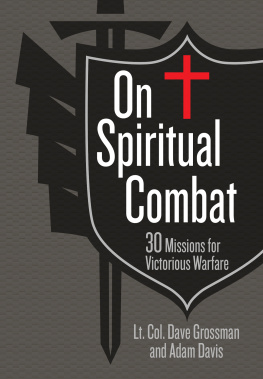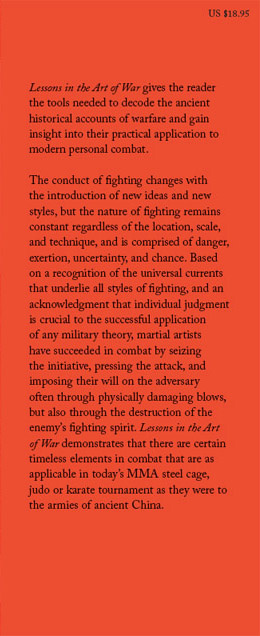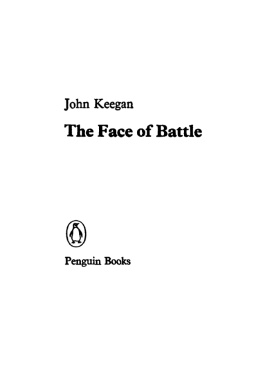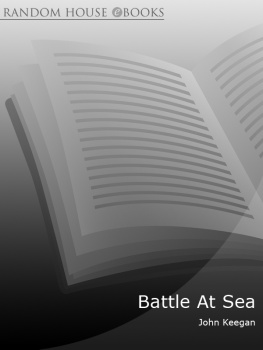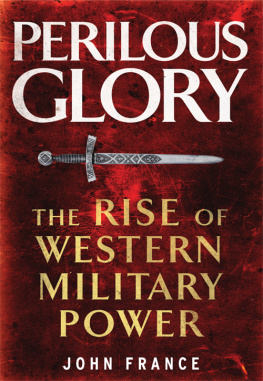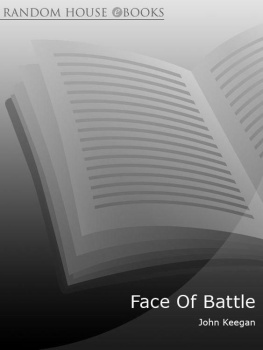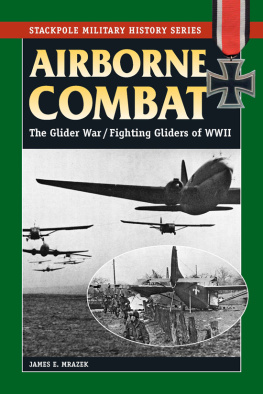All rights reserved. Printed in the United States of America. No part of this book may be reproduced in any manner whatsoever without written permission except in the case of brief quotations embodied in critical articles and reviews. For information, address Basic Books, 387 Park Avenue South, New York, NY 10016-8810.
Books published by Basic Books are available at special discounts for bulk purchases in the United States by corporations, institutions, and other organizations. For more information, please contact the Special Markets Department at the Perseus Books Group, 2300 Chestnut Street, Suite 200, Philadelphia, PA 19103, or call (800) 810-4145, ext. 5000, or e-mail .
Lynn, John A. (John Albert), 1943
Battle : a history of combat and culture / John Lynn.
p. cm.
Includes bibliographical references and index.
ISBN 0-8133-3371-7 (hardcover : alk. paper)
1. War. 2. Military history. 3. Combat. 4. Sociology, Military. 5. War and society. 6. Military art and scienceEffect of technological innovations on. I. Title.
ACKNOWLEDGMENTS
Every project finds me in debt to friends and colleagues, but Battle has left me with the longest list of obligations to date. Writing a broad-based comparative history required that I leave the comfortable confines of my own expertise and undertake a long and difficult journey. Luckily for me there were a lot of grand people who helped me along the way by making suggestions, reading chapters, and pointing out areas for improvement. I will now do my best to name and thank them all. However, so many people aided me in one way or another that I am bound to leave somebody out. So, please, forgive me for any oversight. I wrote this book on my own, to be sure, but it was still very much a communal effort.
Let me first thank Fred Jaher, a fine historian and editor, who has once again proven his friendship by going over every word and every argument in this volume. His keen intelligence, sound judgment, and fine eye for language are much appreciated. He also read key chapters in formative versions, notably Chapters and the Epilogue. I occasionally help him out, too, but nowhere near as much as he comes to my rescue.
In the latter stages of work on this volume, I benefited from the efforts of a superb research assistant, Michael Hughes. He not only did the obligatory hard work for me but also read and critiqued several chapters. The world will soon discover what a good historian Mike is, but I already know. Another first-rate research assistant, Lauren Heckler, helped in securing permissions for the illustrations.
I am fortunate to have two university venues, the University of Illinois at Urbana-Champaign, where I hang my hat, and the Ohio State University, where as adjunct professor I make yearly trips to lecture and counsel students. Battle first saw light as lectures at Ohio State over a period of several years. I enthusiastically express my gratitude to colleagues there, Allan R. Millett, Geoffrey Parker, John F. Guilmartin, Jr., and Mark Grimsley. They offered knowledgeable commentary and, above all, made me feel that I mattered. Thanks as well to the graduate students there who discussed my ideas and provided their insights. Go Bucks!
Back at home, my colleague John Buckler helped me by reading an early draft of . My long-time colleague Blair King read and made valuable suggestions concerning the Indian half of the chapter. Pradeep Barua of the University of Nebraska at Kearney, who once was my student, but has always been my teacher, not only read the South Asian section but supplied me with his chapter on ancient India in his soon-to-be-published The State at War in South Asia.
in an earlier form. An abridged version of this chapter appeared in MHQ, The Quarterly Journal of MilitaryHistory, winter 2003.
.
I received the expert help and criticism of Azar Gat on . His published works were essential to this chapter. I not only learned a great deal from them but also mined them for sources.
Because I was determined to display special care in dealing with the sensitive issues of American racism, the excesses of the Pacific War, and the dropping of the atomic bomb on Japan, I was particularly careful to confer with a broad range of scholars concerning . My thanks go to Allan Millett and Mark Grimsley at the Ohio State Universitywhat a pleasure to gain from such expertise. Robert Rush, then a grad student at Ohio State and now with the U.S. Army Center of Military History, offered valuable comments. Three of my colleagues at Illinois, Fred Jaher, Poshek Fu, and Kristin Hoganson, pointed out weaknesses of the chapter for my further attention. I believe the final result is much better for their criticisms.
comes the closest of any part of Battle to being a conduit for someone elses work. Ken also took the time to read over an early draft of the chapter. I must also thank Ken Cuno, a historian of Egypt at the University of Illinois, for pointing out where I needed to revise my efforts substantially. He was immensely helpful.
The epilogue first began to take shape as a paper for a conference on terrorism held at the University of Illinois in October 2002. Thanks to Mark Steinberg for letting me take part and for reading my words. The much expanded epilogue in this edition of Battle benefited from the new course on terrorism that I taught at the University of Illinois in the fall of 2003. I owe special thanks to family members, Sharron White and Tod White, who read the new epilogue and made extremely valuable comments. Also, I am indebted to my wife, Andrea, who edited the epilogue with care. Also, I owe thanks to Buffy SainteMarie for discussing the meanings of her song Universal Soldier and suggesting that I emphasize its appeal for responsibility.
I also owe recognition and thanks to two institutions at the University of Illinois. First, the Research Board once again supported my work by providing me with funds for research assistants. Second, the marvelous and varied collections at the Library at the University, a true wonder, greatly eased the task of pursuing comparative work.
This has been a long list, but it needs to be even longer, because the authors whose books and articles I discuss in Battle were all congenial colleagues, even when my only contacts with them were their words on a page. These scholars explained the past and pointed the way to many other studies and original sources.
I must also express my gratitude for the support I have received from Westview Press. Peter Kracht encouraged me to take on a big project and sponsored Battle with the press before he left for Greenwood. My current editor, Steve Catalano, has not only been unflaggingly cheerful and supportive but shown himself to be a very, very perceptive editor. He has done much to make this a better book.

